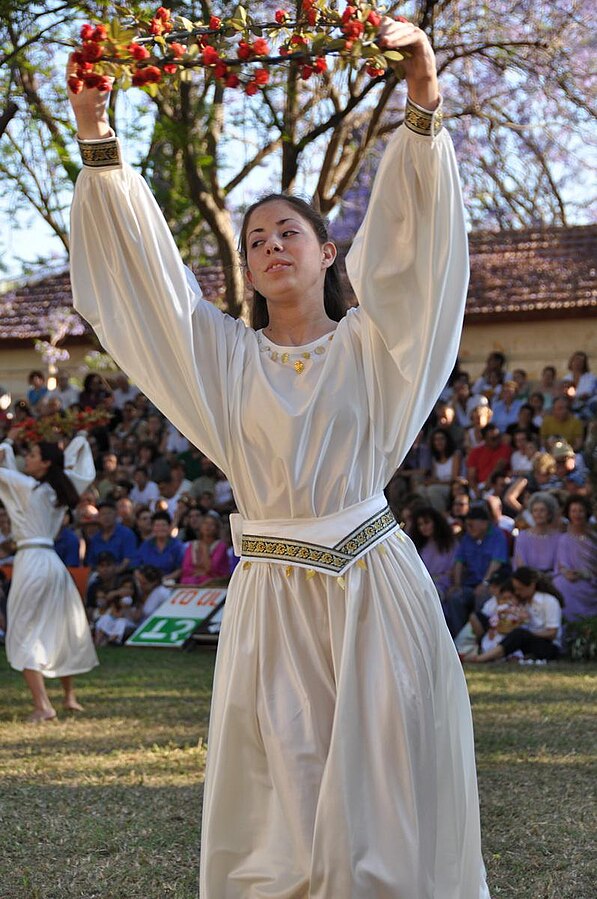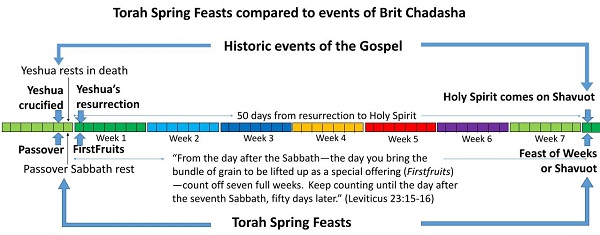Jews celebrate Hag Shavuot or Shvues fifty days after Passover (Pesach). It originates from instructions in the Torah prescribed by Moses (Moshe) some 3500 years ago. However, today Jews celebrate Shavuot for various reasons and in diverse traditions. It is in the synthesis of its three main traditions today that we can grasp its significance.
… From Ten Commandments

The primary Jewish focus today of Shavuot is to celebrate the giving of the Ten Commandments on Mount Sinai. This is because we can trace the days between Passover (Pesach) to the giving of the Ten Commandments. They hover around 50 days. Let’s see how.
The first Passover/Pesach occurred on the evening of Nisan 14.
Take care of them [Passover lambs] until the fourteenth day of the month, when all the members of the community of Israel must slaughter them at twilight.
Exodus 12:6
So Passover/Pesach was (and always is) on Nisan 14. Tracing events recorded in the Torah from that first Passover and then the parting of the sea we can count off the days…
The whole Israelite community set out from Elim and came to the Desert of Sin, which is between Elim and Sinai, on the fifteenth day of the second month after they had come out of Egypt.
Exodus 16:1
On the first day of the third month after the Israelites left Egypt—on that very day—they came to the Desert of Sinai.
Exodus 19:1
Then, when the Israelites arrived in the Sinai desert…
And the Lord said to Moses, “Go to the people and consecrate them today and tomorrow. Have them wash their clothes 11 and be ready by the third day, because on that day the Lord will come down on Mount Sinai in the sight of all the people.
Exodus 19:10-11
So G-d gave the Ten Commands on the 3rd day of the third month. The length of a lunar month is 29.53059 days. However, months are not made up of partial days. Some months are assigned 29 days and others have 30 so that over a long cycle whole days sync with months and years. Then the number of days from the Passover (Pesach) to the Ten Commandments is:
| Month | Interval within the month | Number of Days |
| First | 30 – 14 | 16 |
| Second | 29 or 30 | 29 or 30 |
| Third | 3 | 3 |
| Total | 48 or 49 |
Recognizing that perhaps the start and end days could be inclusive we can see that 50 days from that first Passover/Pesach to the Ten Commandments is reasonable. But it requires a few assumptions.
Because of this 50 day interval, Shavuot traditions today usually focus on the Ten Commandments.
From Torah’s Schedule of Feasts

However this connection between the Ten Commandments and Shavuot is primarily inferred rather than explicitly stated. But the Torah gives an explicit schedule. Going through the spring feasts in Leviticus Moses (Moshe) wrote:
“‘From the day after the Sabbath, the day you brought the sheaf of the wave offering, count off seven full weeks.
Leviticus 23: 15
The ‘day after the Sabbath’ mentioned here is the Feast of First Fruits which the Torah scheduled on the first ‘day after sabbath’ right after Passover (Pesach). The day of the week that Passover falls on varies from year to year. The count from that First Fruits Festival would go according to these Torah instructions:
Count off fifty days up to the day after the seventh Sabbath (Shabbat), and then present an offering of new grain to the Lord. 17 From wherever you live, bring two loaves made of two-tenths of an ephah of the finest flour, baked with yeast, as a wave offering of firstfruits to the Lord. 18 Present with this bread seven male lambs, each a year old and without defect, one young bull and two rams. They will be a burnt offering to the Lord, together with their grain offerings and drink offerings—a food offering, an aroma pleasing to the Lord. 19 Then sacrifice one male goat for a sin offering and two lambs, each a year old, for a fellowship offering. 20 The priest is to wave the two lambs before the Lord as a wave offering, together with the bread of the firstfruits. They are a sacred offering to the Lord for the priest. 21 On that same day you are to proclaim a sacred assembly and do no regular work. This is to be a lasting ordinance for the generations to come, wherever you live.
Leviticus 23: 16-21
So, we should recognize that Moses (Moshe) gave no explicit connection between the Ten Commandments and Shavuot. Rather, he laid out a timetable of 7 * 7 +1 = 50 days from First Fruits with sacrificial instructions given for Shavuot. This explains why Shavuot is also called Pentecost. Since the Jewish nation discontinued the sacrificial system after the destruction of the Second Temple in 70 CE, and with the reasonably inferred timing to the Ten Commandments, we understand how the focus for Shavuot came to center on the Ten Commandments rather than First Fruits after 70 CE.
Shavuot in Brit Chadasha
The third tradition for Shavuot originates in the Brit Chadasha. Fifty days after the First Fruits when Yeshua rose from the dead, with scheduling of the feasts as per Moses’ explicit instructions in the Torah reviewed above, the Brit Chadasha recounts:
The festival of Shavu‘ot arrived, and the believers all gathered together in one place. 2 Suddenly there came a sound from the sky like the roar of a violent wind, and it filled the whole house where they were sitting. 3 Then they saw what looked like tongues of fire, which separated and came to rest on each one of them. 4 They were all filled with the Ruach HaKodesh and began to talk in different languages, as the Spirit enabled them to speak.
5 Now there were staying in Yerushalayim religious Jews from every nation under heaven. 6 When they heard this sound, a crowd gathered; they were confused, because each one heard the believers speaking in his own language. 7 Totally amazed, they asked, “How is this possible? Aren’t all these people who are speaking from the Galil? 8 How is it that we hear them speaking in our native languages? 9 We are Parthians, Medes, Elamites; residents of Mesopotamia, Y’hudah, Cappadocia, Pontus, Asia, 10 Phrygia, Pamphylia, Egypt, the parts of Libya near Cyrene; visitors from Rome; 11 Jews by birth and proselytes; Jews from Crete and from Arabia. . . ! How is it that we hear them speaking in our own languages about the great things God has done?” 12 Amazed and confused, they all went on asking each other, “What can this mean?”
Acts 2:1-12
Why were there ‘religous Jews from every nation under heaven’ on that Shavuot festival? Because when Shavuot was celebrated within Moses’ sacrificial system, as Jews did before the destruction of the Second Temple, this festival required observant Jews to offer sacrifices at the Temple in Jerusalem (as also did Passover/Pesach and Sukkot).
Thus the crucifixion, resting in death, resurrection and then coming of the Holy Spirit all happened on the four spring festival days prescribed by Moses in Leviticus 23. Is that just an uncanny coincidence? We explore this further in the context of the fall feasts here.

So the Holy Spirit (Ruach HaKodesh) descended and the disciples of Yeshua could then speak in the many languages of the Roman Empire.
But as the Jews witnessing this event asked, “What can this mean?”
The Coming of the New Covenant – Brit Chadasha
When one reads through the events recorded in the Torah the inability of the Israelites to keep the Ten Commandments stands out. I list some of the events that come to mind:
- Golden Calf breaking the first two Commandments even before Moses (Moshe) returned from Mt Sinai (Exodus 32)
- Treating G-d with contempt in rebelling against entering the Promised Land recorded in Numbers 14
- Rebellion against G-d at Meribah as recorded in Numbers 20
- The Bronze snake rebellion recorded in Numbers 21
- Adultery with Moabite women as recorded in Numbers 25
The failure of the Israelites stands in contrast to the obedience of Moses (Moshe). But Moses had more than the Law to support him. The Torah states that:
I will come down and speak with you there, and I will take some of the power of the Spirit that is on you and put it on them…
Numbers 11:17
Moses (Moshe) had the Spirit of G-d on him and this enabled his powerful leadership and Holy obedience. But the ‘Spirit of G-d’ limited Himself to empowering Moses and a few other leaders.
A cursory reading through the subsequent books in the Tanakh shows the same pattern of Israelite disobedience repeat itself. As explained here this climaxed in the destruction of the First Temple and the Babylonian exile.

SalemOptix, CC0, via Wikimedia Commons
The Verdict: Unable to keep the Commands
The unequivocal verdict is that the Israelites were unable to keep the Commandments. Subsequent Jewish traditions attempt to build in disciplines and safe-guards to maintain stricter observance of the Commands. You can judge for yourself how successful various traditions maintain law-keeping. But on a larger, social perspective when one scans the news it remains full of accounts of adultery, bribery, dishonesty, and various moral compromises.
Then if you put your own life under the examining glare of the Commandments how do you fare?
G-d does not give up
Knowing full well the failure of His people to keep His Commands, G-d nevertheless did not gave up on them. The prophet Jeremiah, at the destruction of the First Temple, foresaw a bright future under a ‘new covenant’. Thinking back to Moses who had the ‘Sprit of G-d’ on him, Jeremiah foresaw:
“The days are coming,” declares the Lord,
Jeremiah 31:31-34
“when I will make a new covenant
with the people of Israel
and with the people of Judah.
32 It will not be like the covenant
I made with their ancestors
when I took them by the hand
to lead them out of Egypt,
because they broke my covenant,
though I was a husband to them”
declares the Lord.
33 “This is the covenant I will make with the people of Israel
after that time,” declares the Lord.
“I will put my law in their minds
and write it on their hearts.
I will be their God,
and they will be my people.
34 No longer will they teach their neighbor,
or say to one another, ‘Know the Lord,’
because they will all know me,
from the least of them to the greatest,”
declares the Lord.
“For I will forgive their wickedness
and will remember their sins no more.”
Fulfilled in that Shavuot recorded above
G-d’s promise of a new covenant prophesied by Jeremiah, one not written on stone but on the hearts of His people, was fulfilled when the Spirit of G-d, which had been on Moses (Moshe), now came upon regular Israelites. Peter (Shimon), one of the disciples of Yeshua, stood up and gave a detailed explanation of the coming of the Spirit. His entire discourse is given here.
So the people’s shortcomings revealed by the law, and the promised hope of an inner law written on human hearts by the Spirit converged on that historic Shavuot. The Spirit that rested upon Moses is now available to indwell your heart and mine so we can follow the Law of G-d. The Shavuot recorded in Acts has made this all possible. The foretelling of this Shavuot through the feast prescribed by Moses 1500 years beforehand reveals G-d’s fingerprints behind the planning and scheduling of these events.
The seemingly random details of the Passover (Pesach) and First Fruits Festivals become clear through Yeshua. So also now we can understand Shavuot through his fulfillment of it.